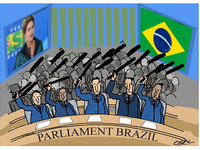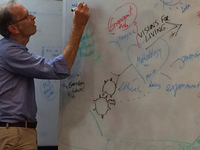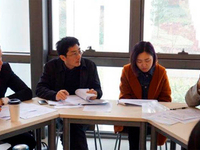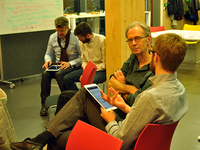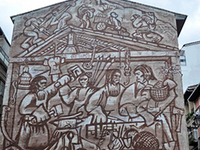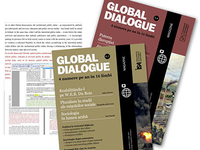GD 6.3 - September 2016
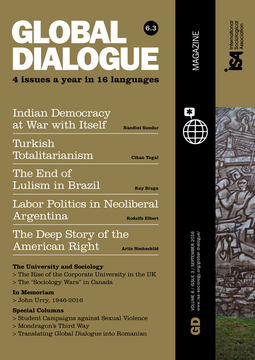
Global Dialogue is available in multiple languages!
Select the language to download the issue.
Editors:
Michael Burawoy.
Associate Editor:
Gay Seidman.
Managing Editors:
Lola Busuttil, August Bagà.
Consultants:
Ana Villarreal.
Media Consultant:
Gustavo Taniguti.
Consulting Editors:
Margaret Abraham, Markus Schulz, Sari Hanafi , Vineeta Sinha, Benjamín Tejerina, Rosemary Barbaret, Izabela Barlinska, Dilek Cindoğlu, Filomin Gutierrez, John Holmwood, Guillermina Jasso, Kalpana Kannabiran, Marina Kurkchiyan, Simon Mapadimeng, Abdul-mumin Sa’ad, Ayse Saktanber, Celi Scalon, Sawako Shirahase, Grazyna Skapska, Evangelia Tastsoglou, Chin-Chun Yi, Elena Zdravomyslova.
REGIONAL EDITORS
Arab World: Sari Hanafi , Mounir Saidani.
Argentina: Juan Ignacio Piovani, Pilar Pi Puig, Martín Urtasun.
Brazil: Gustavo Taniguti, Andreza Galli, Ângelo Martins Júnior, Lucas Amaral, Benno Alves, Julio Davies.
India: Ishwar Modi, Rashmi Jain, Jyoti Sidana, Pragya Sharma, Nidhi Bansal, Pankaj Bhatnagar.
Indonesia: Kamanto Sunarto, Hari Nugroho, Lucia Ratih Kusumadewi, Fina Itriyati, Indera Ratna Irawati Pattinasarany, Benedictus Hari Juliawan, Mohamad Shohibuddin, Dominggus Elcid Li, Antonius Ario Seto Hardjana.
Iran: Reyhaneh Javadi, Abdolkarim Bastani, Niayesh Dolati, Mitra Daneshvar, Vahid Lenjanzade.
Japan: Satomi Yamamoto, Yutaro Shimokawa, Shinsa Kameo, Yuki Nakano.
Kazakhstan: Aigul Zabirova, Bayan Smagambet, Adil Rodionov, Gani Madi, Almash Tlespayeva, Almas Rakhimbayev, Amangeldi Kurmetuly.
Poland: Jakub Barszczewski, Adrianna Drozdrowska, Krzysztof Gubański, Justyna Kościńska, Kamil Lipiński, Mikołaj Mierzejewski, Karolina Mikołajewska-Zając, Adam Müller, Zofi a Penza, Teresa Teleżyńska, Anna Wandzel, Justyna Zielińska, Jacek Zych.
Romania: Cosima Rughiniș, Corina Brăgaru, Costinel Anuța, Tatiana Cojocari, Andrei Dobre, Alexandra Isbășoiu, Rodica Liseanu, Mihai-Bogdan Marian, Anda-Olivia Marin, Ramona Marinache, Anca Mihai, Oana-Elena Negrea, Ion Daniel Popa, Diana Tihan, Elena Tudor, Cristian Constantin Vereș, Carmen Voinea, Irina Zamfi rescu.
Russia: Elena Zdravomyslova, Anna Kadnikova, Asja Voronkova, Lyubov’ Chernyshova, Anastasija Golovneva.
Taiwan: Jing-Mao Ho.
Turkey: Gül Çorbacıoğlu, Irmak Evren.
GD 6.3 - September 2016
Editorial
Populism of the 21st Century
Between 2011 and 2014 Global Dialogue reported optimistically on the social movements engulfing the world – Arab Uprisings, Occupy movements, Indignados, labor movements, student movements, environmental movements, and struggles against rural dispossession. The optimism was short-lived as these movements set in motion changes that have led to a wave of reactionary populist movements and authoritarian regimes. This issue presents accounts of this right-wing upsurge: Arlie Hochschild’s analysis of Trumpism and the Tea Party in the United States; Cihan Tuğal’s examination of the authoritarian turn in the Turkish regime; Ruy Braga’s explanation of the right-wing coup in Brazil; Rodolfo Elbert’s dissection of the neoliberal turn in Argentina; and Nandini Sundar’s graphic portrait of the on-going violence in India against the Naxelite movement. As we have argued on previous occasions we can see these movements in terms of Karl Polanyi’s analysis of the over-extension of the market. Specifically, today the rule of finance capital has led to the globalization of precarity, giving rise to swings between right-wing and left-wing populist movements, both sharing the rejection of parliamentary politics.
We can also see financialization at work in our university systems. Thus, in this issue, Huw Beynon analyzes the dysfunctional managerialism that has overtaken the British university as it tries to stay economically afloat. He describes how the system of evaluating research “excellence” produces mediocrity, and how the dependence on fees has turned students into consumers and universities into advertising agencies, competing to maximize student “satisfaction.” It is an open question whether UK’s corporate model is leading the rest of the world or whether moderation will prevail as it does in the Canada described by Neil McLaughlin and Antony Puddephatt – although even here the academic world had to weather the storm of a conservative Prime Minister.
We publish four tributes to the life and work of John Urry, who sadly and unexpectedly passed away in March of this year. John Urry was one of the world’s most original and prolific sociologists, a pioneer in so many areas: from the transformation of capitalism to the significance of tourism that set in motion a research program into social and geographical mobilities; from global warming to his recent and very disturbing book, Offshoring, that dwelt on the expanding economy of secrecy that is intensifying global inequalities and humans rights violations. He will perhaps best be remembered as a pioneer of the sociology of the future, daring to forecast the catastrophes to which our planet is heading.
We have three further articles: on the burgeoning student movements against sexual harassment in the US; a defense of the great Mondragon cooperative against its detractors; and, finally, how Global Dialogue’s Romanian team meets the challenges of translation. We hope other teams will write about their own experiences of translating sociology from English into different national languages.
Michael Burawoy, editor of Global Dialogue
Global Dialogue can be found in multiple languages.
Submissions should be sent to globaldialogue@isa-sociology.org.



